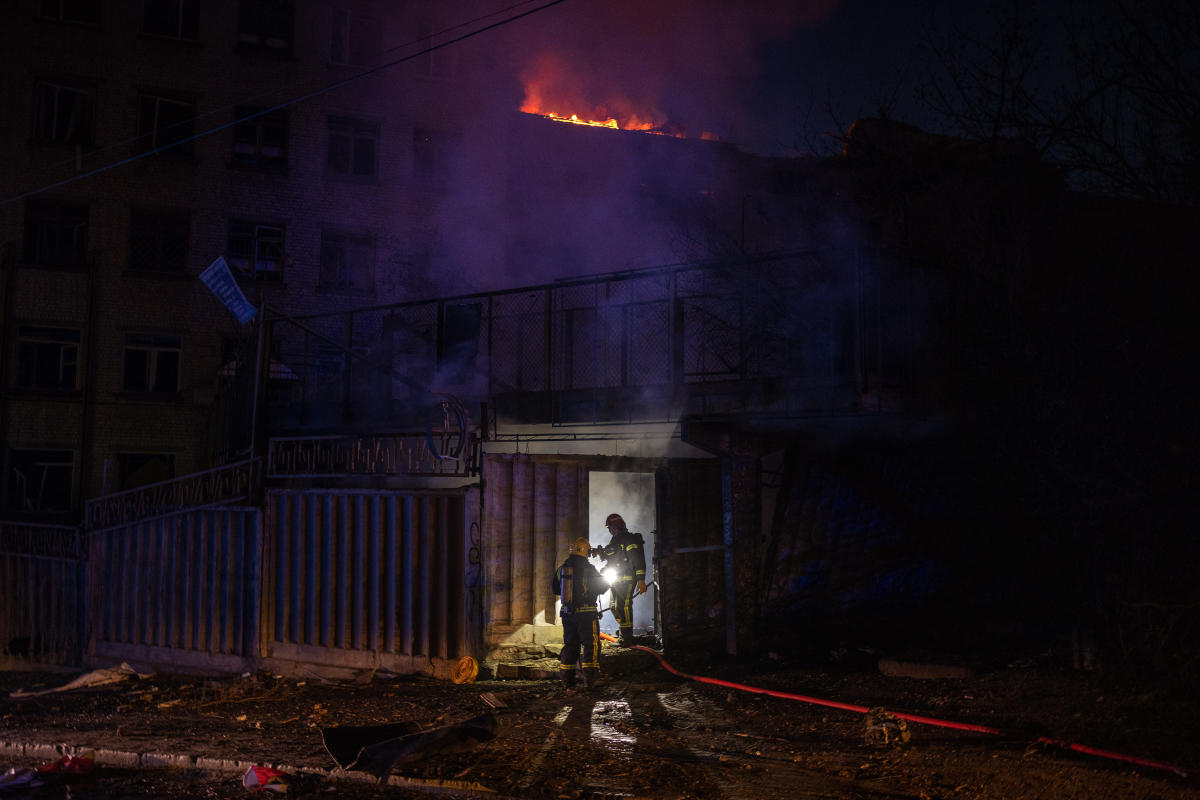
KYIV, Ukraine — Ukrainian President Volodymyr Zelenskyy accused Russia of trying to destroy the Donbas and all who live there.
“The constant brutal bombardments, the constant Russian strikes on infrastructure and residential areas show that Russia wants to empty this territory of all people. Therefore, the defense of our land, the defense of our people, is literally a fight for life,” he said late Friday in his nightly video address to the nation.
He said the cities and towns of the Donbas will survive only if Ukraine remains standing. “If the Russian invaders are able to realize their plans even partially, then they have enough artillery and aircraft to turn the entire Donbas into stones. As they did with Mariupol.”
Zelenskyy said Mariupol, once one of the most developed cities in the region, was now a “Russian concentration camp among the ruins.”
In Kharkiv, a major city to the north, the situation was “brutal” but Ukrainian troops and intelligence agents “have had important tactical successes,” he said without elaborating.
Zelenskyy said rescuers were still going through the rubble in Kyiv after Thursday’s missile strikes. He expressed his condolences to the family of Vira Hyrych, who was killed in the bombardment. He said she was the 23rd journalist killed in the war.
___
KEY DEVELOPMENTS IN THE RUSSIA-UKRAINE WAR:
— Ukraine cracks down on anyone suspected of aiding Russian troops
— A former U.S. Marine became the first known American to die fighting for Ukraine
— Ukraine slams Kyiv attack amid new Mariupol rescue effort
— Ukraine says Russian offensive in east picks up momentum
— NATO chief says Finland, Sweden could join quite quickly
Follow all AP stories on Russia’s war on Ukraine at https://apnews.com/hub/russia-ukraine
___
OTHER DEVELOPMENTS:
DUBAI, United Arab Emirates — Russian Foreign Minister Sergey Lavrov appears to have dismissed the need for the United Nations to help secure humanitarian corridors out of Ukraine’s besieged cities, striking a tough line a day after the U.N. chief toured war-wracked Kyiv with that very aim.
As an interviewer at Saudi-owned Al-Arabiya TV tried to ask Lavrov about U.N. Secretary-General Antonio Guterres’ proposals for humanitarian assistance and evacuation of civilians, Lavrov cut him off.
“There is no need. I know, I know,” an irritated Lavrov said. “There is no need for anybody to provide help to open humanitarian corridors. There is only one problem … humanitarian corridors are being ignored by Ukrainian ultra-nationals,” he said.
“We appreciate the interest of the secretary-general to be helpful,” he added. “(We have) explained … what is the mechanism for them to monitor how the humanitarian corridors are announced.”
During the hourlong interview, Lavrov also accused the West of sabotaging Russia’s peace talks with Ukraine. He claimed that thorny negotiations in Istanbul last month had been progressing on issues of Russian territorial claims and security guarantees until Ukrainian diplomats backtracked at the behest of the West.
“We are stuck because of their desire to play games all the time,” Lavrov said. “Because of the instructions they get Washington, from London, from some other capitals, not to accelerate the negotiations.”
When asked about the risks of war spilling into neighboring Moldova after a series of explosions rattled a breakaway border region within the country, Lavrov struck an ominous tone.
“Moldova should worry about their own future,” he said. “Because they’re being pulled into NATO.”
___
KHARKIV, Ukraine — Ukrainian authorities are cracking down on anyone suspected of aiding Russian troops under laws enacted by Ukraine’s parliament and signed by President Volodymyr Zelenskyy after the Feb. 24 invasion.
Offenders face up to 15 years in prison for acts of collaborating with the invaders or showing public support for them.
Not all Ukrainians oppose the invasion, and pro-Moscow sentiment is more common among Russian-speaking residents of the Donbas, an industrial region in the east.
Although the Zelenskyy government has broad support, even among many Russian speakers, not all Ukrainians oppose the invasion. Support for Moscow is more common among some Russian-speaking residents of the Donbas, an industrial region in the east. An eight-year conflict there between Moscow-backed separatists and Ukrainian government forces had killed over 14,000 people even before this year’s invasion.
Some businessmen, civic and state officials and members of the military are among those who have gone over to the Russian side, and Ukraine’s State Bureau of Investigations said more than 200 criminal cases on collaboration have been opened. Zelenskyy has even stripped two SBU generals of their rank, accusing them of treason.
A “registry of collaborators” is being compiled and will be released to the public, said Oleksiy Danilov, head of Ukraine’s Security Council. He refused to say how many people have been targeted nationwide.
With martial law in place, authorities have banned 11 pro-Russian political parties, including the largest one that had 25 seats in the 450-member parliament – the Opposition Platform For Life, which was founded by Viktor Medvedchuk, a jailed oligarch with close ties to Putin.
___
KHARKIV, Ukraine — Hundreds of people have been evacuated to Kharkiv from the nearby village of Ruska Lozava that had been under Russian occupation for more than a month.
Almost half the village has escaped on buses, in shrapnel-ridden cars or on foot after fierce battles saw Russian troops pushed back and Ukrainian forces take full control of the village, according to the Kharkiv regional governor.
A video posted by the Azov battalion shows troops raising the blue and yellow Ukrainian flag over the government building in the center of the village although fighting continues on the outskirts.
Upon arrival to Kharkiv less than 12 miles (20 kilometers) away, those who fled have described to Associated Press reporters the dire conditions they faced while living in basements with little water and food and no electricity.
“We were hiding in the basement, it was horror. The basement was shaking from the explosions, we were screaming, we were crying and we were praying to god,” said Ludmila Bocharnikova.
___
WASHINGTON — A former U.S. Marine was killed while fighting alongside Ukrainian forces, according to his relatives, making his the first known death of an American citizen while fighting in the war against Russia.
Willy Joseph Cancel, 22, was killed Monday while working for a military contracting company that sent him to Ukraine, his mother, Rebecca Cabrera, told CNN. Cancel joined the Marines after graduating from Newburgh Free Academy in New York and served from 2017-21. He more recently worked as a corrections officer in Tennessee.
Cabrera said her son signed up to work with the private military contractor shortly before fighting began in Ukraine on Feb. 24 and that he agreed to go to Ukraine. She said he flew to Poland on March 12, entered Ukraine shortly thereafter and had been fighting alongside men from a number of countries.
“He wanted to go over because he believed in what Ukraine was fighting for, and he wanted to be a part of it to contain it there so it didn’t come here, and that maybe our American soldiers wouldn’t have to be involved in it,” she said.
Cabrera said her son’s body hasn’t been recovered.
Cancel had also served as a volunteer firefighter in New York and leaves behind a wife and 7-month-old son, according to an online fundraising page set up by a man identifying himself as Cancel’s father. Cancel’s wife received the call informing her of his death on Tuesday, the page said.
___
KYIV, Ukraine — A leading Ukrainian political analyst says Russia’s missile strike on Kyiv signaled its intention to keep fighting despite international efforts to mediate an end to the hostilities.
Volodymyr Fesenko, head of the Kyiv-based Penta Center think tank, said Thursday’s strike on Kyiv while U.N. Secretary-General Antonio Guterres was visiting the city indicated Moscow’s intention to press its attack.
“Russia is sending a clear signal about its intention to continue the war despite the international pressure,” Fesenko told The Associated Press.
“With this missile strike, the Kremlin is sending a warning to all international structures and organizations trying to influence or contain Russia’s aggressive military plans,” Fesenko noted. “While Russia has so far failed to score any significant gains in Ukraine, it intends to continue its offensive and keep striking cities with missiles.”
The attack reportedly killed at least one person and wounded at least 10 others, and was the first on Kyiv since Russia refocused its efforts on the Donbas region in eastern Ukraine. Guterres and his team were not injured.
___
LVIV, Ukraine — The mayor of the besieged Ukrainian city of Mariupol says those hiding at a massive steel mill are running out of food, water and medicine.
Vadym Boichenko described the situation at the Avozstal steel plant as dire. The steel mill is the last position held by Ukrainian fighters, who also are with civilians.
The Soviet-era facility has a vast underground network of bunkers able to withstand airstrikes. But the situation has grown more extreme after the Russians dropped a series of so-called “bunker buster” bombs and unguided munitions.
“Locals who manage to leave Mariupol say it is hell, but when they leave this fortress, they say it is worse,” Boichenko said, according to a translator. “They are begging to get saved.”
He added: “There, it’s not a matter of days, it’s a matter of hours.”
Boichenko said he hoped a cease-fire would allow those inside the steel mill to safely leave. Russia earlier offered a truce that was rejected by Ukrainians, who said Moscow previously broke other agreements.
“We hope there’s a slight touch of humanity in the enemy,” the mayor said.
Boichenko spoke Friday in a government-organized video conference.
___
MOSCOW — The head of the Russian Central Bank says the outlook is “extremely uncertain” as the country’s economy is expected to contract by up to 10% this year.
International sanctions and falling consumer demand are squeezing the economy as inflation rises.
The Central Bank cut its key interest rate from 17% to 14% on Friday and predicted the economy would shrink by between 8% and 10% this year.
“The current situation is extremely uncertain. Simultaneously, supply trends and the factors driving aggregate demand are also changing dramatically,” Central Bank head Elvira Nabiullina said.
The Central Bank said annual inflation was 17.6% as of April 22 and forecast it would rise to between 18% and 23% by the end of the year.
“After a temporary surge, consumer demand is decreasing in real terms, accompanied by a rise in households’ propensity to save. The decline in imports due to the introduction of external trade and financial restrictions is outstripping the decline in exports,” the Central Bank said in a statement.
“Despite the gradual change in the country and commodity structure of exports and imports as new suppliers and sales markets emerge, businesses are experiencing considerable difficulties in production and logistics.”
___
WARSAW, Poland — Ukraine’s first lady, Olena Zelenska, said the war hasn’t changed her husband and has only revealed his qualities to the world, including his determination to prevail.
Zelenska, speaking in an interview with the Polish newspaper Rzeczpospolita published Friday, also said she has not seen her husband President Volodymr Zelenskyy since Russia invaded Ukraine.
“Since Feb. 24, I have been seeing my husband just like you — on TV and on video tapes of his speeches,” she said.
She accused Russia of trying to carry out a genocide against the Ukrainian people and expressed her sympathy with all those who have been forced to flee their homes.
“I wish I could hug each of them. It is easy to imagine the difficult path they went through, escaping from basements or bunkers in Mariupol, from firing from Kharkiv, from the occupied Kyiv region, and even from Lviv or Odesa, which were also under fire from Russian missiles,” she said.
The newspaper, making clear that it interviewed Zelenska remotely and not revealing her location, asked her if the war had changed her husband.
“The war has not changed him,” she replied. “He has always been a man you can rely on. A man who will never fail. Who will hold out until the end. It’s just that now the whole world has seen what may not have been clear to everyone before.”
___
LONDON — Tens of thousands of troops from NATO and other north Atlantic nations will take part in a series of military exercises across Europe in the coming weeks as western countries seek to deter Russian aggression.
The exercises, backed by aircraft, tanks, artillery and armored assault vehicles, will take place in Finland, Poland, North Macedonia and along the Estonian-Latvian border. They will include troops from NATO and the Joint Expeditionary Force, which includes non-NATO members Finland and Sweden.
“The scale of the deployment, coupled with the professionalism, training and agility of the British Army, will deter aggression at a scale not seen in Europe this century,” Lt. Gen. Ralph Wooddisse, commander of the U.K.’s field army, said in a statement.
The deployments will begin this week in Finland, where troops from the U.S., Britain, Estonia and Latvia will participate in Exercise Arrow to improve their ability to work alongside Finnish forces.
Also this week, some 4,500 troops will take part in Exercise Swift Response, which will include parachute drops and helicopter-borne assaults in North Macedonia. The operation will include forces from U.S., Britain, Albania, France and Italy.
Next month, 18,000 NATO troops, including forces from Britain, France and Denmark, will take part in Exercise Hedgehog along the Estonia-Latvia border.
In late May, about 1,000 British soldiers will join troops from 11 other nations for Exercise Defender in Poland.
“The security of Europe has never been more important,” U.K. Defense Secretary Ben Wallace said. “These exercises will see our troops join forces with allies and partners across NATO and the Joint Expeditionary Force in a show of solidarity and strength in one of the largest shared deployments since the Cold War.”
___
The US-funded broadcaster Radio Free Europe/Radio Liberty says one of its journalists was killed by a Russian missile strike on Ukraine’s capital, Kyiv, Thursday night.
Vira Hyrych died when the building she lived in was hit and her body was found in the building’s rubble Friday, Radio Free Europe said. Hyrych had worked for the broadcaster’s Ukrainian-language service since 2018, Radio Free Europe said in a statement.
Ten people were wounded in the attack, including at least one who lost a leg, according to Ukraine’s emergency services.
Describing the attack, Russia says it “destroyed production buildings” at a defense factory in Kyiv. Russia used “high-precision, long-range weaponry” to hit the Artem factory in the Ukrainian capital, the Russian Defense Ministry spokesman said Friday.
The spokesman appeared to be referring to strikes on Kyiv that took place on Thursday evening, shortly after a meeting between President Volodymyr Zelenskyy and U.N. Secretary-General António Guterres. Ukrainian Foreign Minister Dmytro Kuleba said cruise missiles were used in the attack and Kyiv Mayor Vitali Klitschko said one person was killed and four hospitalized when a residential building was hit.
Konashenkov also said Russia had destroyed a missile launch site that Ukraine had used to strike the Russia-held Ukrainian city of Kherson.
___
LVIV, Ukraine — A British aid group says it believes two Britons have been abducted by Russian forces in southeastern Ukraine.
The British Foreign Office said it is “urgently seeking more information” about the two men’s case.
Dominik Byrne, the co-founder and chief operating officer of the Presidium Network, told the AP on Friday that the men were last heard from on Monday.
Byrne said the men were taken while trying to carry out an independent evacuation in Dniprorudne, near the city of Zaporizhzhia, some 470 kilometers (290 miles) southeast of Kyiv.
Byrne said the family that the two men had been trying to evacuate later were interrogated by Russian forces, who asked them about the “British spies.” Bryne said the family later escaped to Poland.
Byrne identified the men as Paul Urey and Dylan Healy. He said they had been operating on their own in the war zone and hadn’t been associated with any aid group.
The British Foreign Office did not immediately respond to a request for comment. Russia hasn’t acknowledged taking the men.
___
COPENHAGEN, Denmark — A 25-year-old Dane was allegedly killed in Mykolajiv on April 26 while fighting with the International Legion Ukraine, a unit for foreigners who want to join the fight against Russia, according to Danish broadcaster TV2. The man’s name was not given.
In a statement to Danish media, the Foreign Ministry in Copenhagen said it could not confirm the report and was in contact with Ukrainian authorities.
“It may therefore take time before the details are clarified” because the war creates “extremely difficult conditions,” the statement read.
The Jyllands-Posten daily, one of Denmark’s largest newspapers, said up to 100 Danes have traveled to Ukraine to fight Russia, citing Ukraine’s Embassy in Denmark.
___
LVIV, Ukraine — The British Defense Ministry says Russia’s focus in its war on Ukraine remains the Donbas region.
In an update Friday, the British military said heavy fighting had been seen around Lysychansk and Severodonetsk. The British said they believe Russia is trying to attempt an advance south from Izium toward Slovyansk.
The British military said in a tweet: “Due to strong Ukrainian resistance, Russian territorial gains have been limited and achieved at significant cost to Russian forces.”
The British military has been offering daily public reports on the fighting since the start of the war in February.




